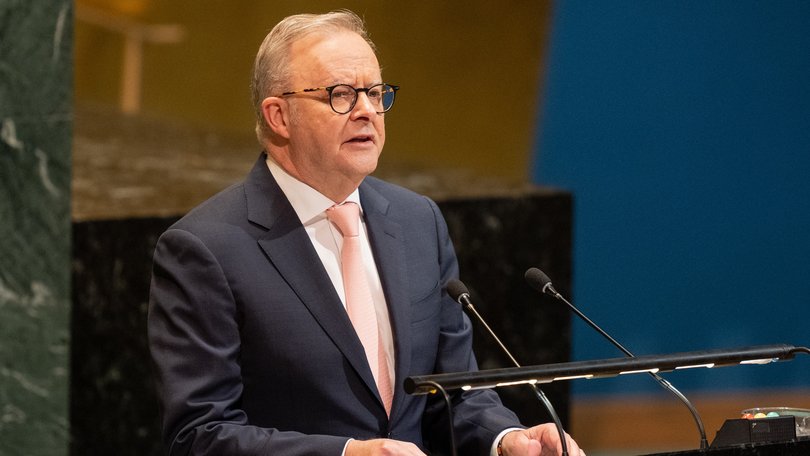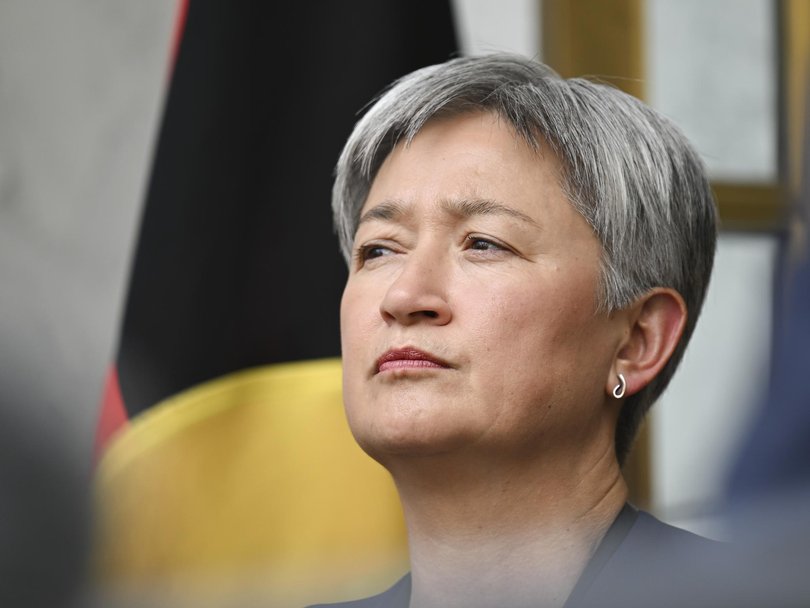Anthony Albanese uses first speech as PM at United Nations to round on the Israeli Government
Anthony Albanese has used his first speech as Prime Minister at the United Nations to round on the Israeli Government saying it must accept its share of responsibility for the humanitarian catastrophe in Gaza.

Anthony Albanese has used his first speech as Prime Minister at the United Nations to round on the Israeli Government saying it must accept its share of responsibility for the humanitarian catastrophe in Gaza.
Mr Albanese has addressed a two-state solution conference convened by French President Emmanuel Macron and the Saudi Arabians at the start of High Level week at the UN General Assembly.
It is the Prime Minister’s first attendance at UNGA, which has been dominated by Western countries including Australia, the UK and Canada — all of whom announcing they are recognising Palestine as a state.
Sign up to The Nightly's newsletters.
Get the first look at the digital newspaper, curated daily stories and breaking headlines delivered to your inbox.
By continuing you agree to our Terms and Privacy Policy.“Right now, Gaza is in the grip of a humanitarian catastrophe,” Mr Albanese told UNGA.
“And for this, the Israeli Government must accept its share of responsibility.
“Tens of thousands of civilians have been killed.
“Desperate people, including children, have been denied vital aid.
“Aid workers have been killed trying to deliver humanitarian assistance, including Australian Zomi Frankcom.”
Mr Albanese said the Israeli Government’s threats to permanently displace the Palestinian people was behind the allies’ break with Israel.
“This comes alongside the continued illegal expansion of settlements on the West Bank and an increase in settler violence,” he said.
“Threats to annexe parts of Palestine — and permanently displace the Palestinian people.
“Such conduct risks putting a two-state solution beyond reach.
“That is where the current road will take us.
“Which is why we must choose a different path.”
Israel’s Prime Minister Benjamin Netanyahu said he would double down and reveal his full response after his visit to the United States later this week.
“It’s not going to happen,” Mr Netanyahu said in a video message.
“There will be no Palestinian state to the west of the Jordan River.
“For years, I have prevented the creation of that terror state, against tremendous pressure, both domestic and from abroad.
“We have done this with determination and with astute statesmanship.
“Moreover, we have doubled the Jewish settlement in Judea and Samaria, and we will continue on this path.
“The response to the latest attempt to force upon us a terror state in the heart of our land will be given after my return from the US. Stand by.”
Mr Netanyahu is set to address the UNGA on Friday.
A major rift has emerged between Israel and Australia with Israel insisting Palestinian recognition rewards Hamas, which continues to hold 48 hostages taken captive in the October 7 attacks.
Home Affairs Minister Tony Burke, who represents a western Sydney electorate with a strong Muslim population said in the lead-up to official recognition, that Israel and Australia’s intelligence relationship remained the same, despite the diplomatic tensions.
Asked by The West Australian if Australia’s change in policy would affect intelligence sharing between Israel and Australia, Mr Burke played down the prospect.
“I don’t talk about intelligence relationships,” Mr Burke said.
“All I can say is that all the different partners that we’ve been working with for years, we continue to work with, and we keep Australians safe as a way of doing that.”
Last month, Israel kicked out Australia’s diplomats in Ramallah, in the occupied West Bank.
Foreign Affairs Minister Penny Wong, who constantly says Australia is not a central player in the Middle East, denied that this showed the move was about shoring up domestic votes.
“This is not driven by those considerations,” Senator Wong said.
“This decision is driven by what we see in Gaza.
“This decision is driven by the deaths of so many civilians.
“This decision is driven by a war, a conflict, that I think has reached unimaginable proportions.
“And this decision is driven by a famine that exists in Gaza.

“So, the international community has come together and said we have to do something.
“And of course, I recognise that Australia is not able by itself to stop this war, but what we can do is add our voice to pressing for peace, momentum for peace.
“ And that is why we have recognised, that is why we see so many other countries making similar commitments, it is the desire of the international community for peace.”
A poll conducted by DemosAU at the end of July showed the ongoing humanitarian toll in Gaza was increasing public support for recognising Palestine, with 45 per cent of the 1079 Australians surveyed in favour, up 10 per cent.
In the UK, pollsters YouGov gauged similar backing among Brits with 44 per cent in support.
But James Johnson from JL Partners cautioned against overstating public favour for recognising Palestinian statehood, saying that his research conducted in Britain showed a complete collapse in support when further questions were asked.
He found that unconditional support for recognising Palestine was as low as 13 per cent of Britons and 11 per cent among Labour voters.
More than half opposed recognition while Hamas controlled Gaza, which is currently the case.
“Most polling on Palestine recognition asks a simple question — do you support or oppose the idea?” Mr Johnson said.
“This tends to show just under half of the British population in favour of recognition, with large amounts of unsure voters and around one-in-six opposed.
“But when you dig deeper, and ask people which conditions should apply before the UK takes any steps towards recognising Palestine, that support collapses.
“Only one-in-10 back recognition without any conditions.
“If we are to consider what British people think of recognition in reality, as of today, the top-line polling on this is a mirage.”

